#alphabet film challenge
Text

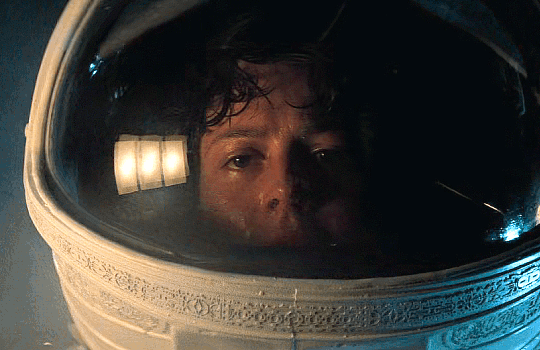
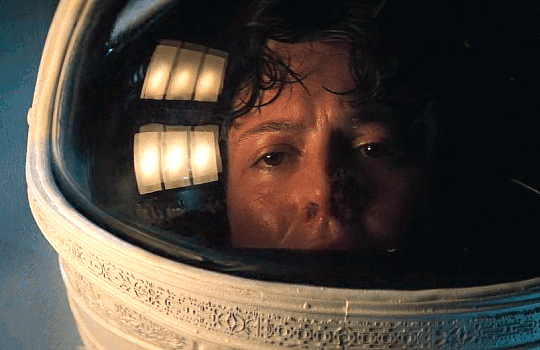
SIGOURNEY WEAVER IN ALIEN (1979)
#my gifs.#alphabet film challenge#filmgifs#dailyflicks#cinematv#cinemapix#filmtvdaily#userstream#mediagifs#scifiedit#horroredit#alienedit#ridley scott#sigourney weaver#flash warning
925 notes
·
View notes
Text
All that I ask is that you stay with me | Inner Demons
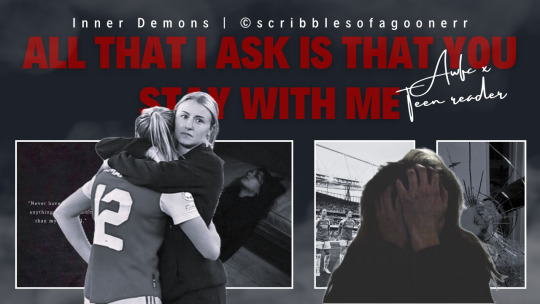

⟫ Alphabet Challenge, A - All that I ask is that you stay with me
Pairings: leah williamson x teen reader, arsenal wfc x teen reader

This is some angst that I thought to write because, well, life's been hard recently and I need a creative outlet to get my emotions out on paper and well, this is the result.
It might not be great and it's not been proof-read at all, so uh, yeah... Let me know what you all think but please be kind :)
And if any of you have any ideas of things to write, I'm open to write anything, within reason of course. My asks are open so feel free to drop anything in there :)
The battle with your inner demons are hard. You sometimes wonder if it's better to leave the world, making the decision without the realisation of how loved you are by the team of girls around you.
TW: heavy angst, SH, MH and talks of suicide and death.
"Y/N are you in there? Hurry up, we're about to start the film" The loud voice of Katie shouts aloud from the other side of the closed bathroom door to alert you of your attention.
You were joined by the girls in a classic team bonding night, a good ol' fashioned film to watch with some sugary treats, curtousy of it being a cheat day.
You are always so excited to spend time with the older girls, you all looked up with some much respect, being a part of the team for a while, you'd grown to love the girls like your own family.
Despite how well you fitted in at the club and how amazing you played football, there would always be people to put you down.
And in this case, it was in the forms of social media.
The internet could be a cruel place sometimes.
"Ye... Yeah, alright. J... Just a minute, I'll be right out" You shakily reply as you held the blade out in front of you while it stared back at you, almost like it was almost taunting you to use it.
Old habits are easy to break, you should have knew that.
It wasn't long before you were slumped on the bathroom floor as you watched the crimson liquid trickle down your arms. It felt like a rush of instant relief to the pain that you currently indured.
One small cut to take away the pain, you thought it would be okay.
Two cuts, you just wanted to chase the rush of the first.
Three, four and five, you realise you may have messed up.
You were doing so well, you had been on the right path to get help. that was needed. You had been clean for a numerous amount of days and just in that instant, the snap of a finger and all of that progress, had just been so easy to unwravle again.
You found it so easy to take a hold of the blade in your hand, press it against your wrist and pierce the skin.
It was a feeling of euphoria that you hadn't felt in a while, it was something that was needed.
The cuts were deep, too deep that even with added pressure, they wouldn't stop bleeding.
"Is this the end now?" You had to question yourself as your eyelids felt heavy, you were so tired and you didn't have it in you to fight anymore.
Was it really that easy to leave a world full of heartache and pain?
Maybe so,
At least you had thought that as you hear the sudden loud bang of the bathroom flying open and clashing against the wall.
"Y/N!" It was Leah's shrill voice that screams out in a panic, her eyes widened in fear as she stares at you. "Y/N, can you hear me?!" she questions with a a quiver in her tone.
"L... Le" You slur her name as you look at the blonde as you can feel yourself slipping into a state of unconciousness.
"Stay awake, Y/N. You have too-- Girls, help!" Leah continues to shout aloud for any of the girls to hear. " You hear me, Y/N? You have to stay awake" she pleads as her tears threaten to spill.
"S' okay, Le. L... Let me go. It's time" You tell her quietly as your eyes flutter between being open and shut.
"No, Y/N. You can't give up... You can't" Leah cries openly, the tears at bay have now escaped. "Stay with me, Y/N. Stay with me, please" she adds, her voice becomes louder as hot tears roll down her cheeks.
The rest of the girls all heard Leah's panicked voice and dart in the direction of the bathroom, each of them gasping in shock to find you slumped on the floor.
"Shit-- Y/N" Beths' eyes widen in fear and panic as she takes in the scene in front of her.
"What happened?" Viv questions, alarmed by the sight.
"S... She's hurt herself" Leahs' panicked voice speaks aloud while she's crouched down on the floor and pressing a towel against your wrists to try and soak up the blood. "I... I can't get the bleeding to stop" she tells them.
"Somebody call an ambulance, quick" Katie states as she joins Leah's side to kneel down and try to help in way that she can.
Her usual joking manner has suddenly turned into fearful and that's when the girls all knew this was serious.
"I'm on it" Jen agrees as fishes her phone out of her pocket, dialing 999 and waiting for an answer on the other side. "I need an ambulance, as soon as possible. It's urgent! My team mates' hurt herself and is in and out of unconciousness" the scots' woman speaks aloud,
"Stay with me, Y/N. Stay with me, keep your eyes open please" Leah pleads as she continues to hold the now blood-soaked towl against your skin, her own tears freely spilling down her cheeks as you daze in and out of sleep.
"W... Why would she do this to herself" Steph questions concerned as she glances at you, heartbroken it had come to this.
"I don't know, she was... she was doing better" Lia spoke out, swallowing the lump in her throat as she tried to keep her own emotions in check.
"At least, we thought she was" Beth mumbles as she struggles to take her eyes off your unconcious body.
"She'll be okay, she has to be" Caitlin adds in with vulnerability in her voice that wasn't usually shown to anyone, other than you.
You were the baby of the team, all of the girls were overprotective of you ever since you joined. It wasn't a secret that you had them all virtually wrapped around your pinky finger.
All the girls knew it was hard for you, you had a lot of expectation to live up to and knew that eventually, the pressure would be too much for you and you would break.
They were all there the last time, they saw the good, the bad and the damn right ugly and vowed to not let it happen again.
But, old habits are easy to break, right?
"Ambulance is on it's way. It won't be long" Jen tells the girls.
"I'm going with her" Leah was quick to say. A tone in her voice which the rest of the girls knew to not object against.
You were close with the girls but compared to them, Leah was pretty much your second-mum, older sister figure all rolled into one and she was the one that you always came to when it got tough.
Why didn't you just speak to her? Then maybe things could be different.
"We'll follow you to the hospital" Kim replies to the blonde and the rest of the girls all nod in agreement, they would always be there for you at a time when you most needed it.
They were your family, and family never turned their back on another.
#arsenal x reader#woso x reader#arsenal women x reader#leah williamson#woso#woso imagine#woso fanfics#heavy angst#leah williamson x reader#arsenal wfc x reader
424 notes
·
View notes
Text
Man Suang Character List
So, one of the challenges with Man Suang is... who's who?
On my second watch, I slowed down and captured names. Following is a list of named characters with brief summaries, as well as notes about their interpersonal relationships.
*** MAJOR SPOILERS ahead, as well as mentions of violence ***
I've divided these into three groups, and each group is in alphabetical order. I also attempted to include titles/labels that were used for the characters.
~~~
MAIN CAST
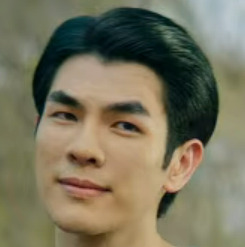
Chatra: (Called Khun Luang by Khem at the end of the film.) Was supposedly at Man Suang looking for his family’s treasure map. However, he was actually investigating the imported weapons and his father’s involvement in the weapons deal. He began a spying partnership with Khem. He told Khem he was from Songkhla.
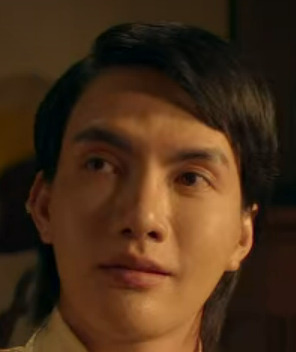
Hong (Young Master/Master): Younger Master of Man Suang. He faked his own death to avoid being assassinated by Tiang. Son of Cheng.
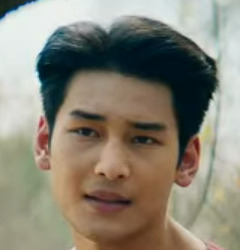
Khem: Dancer. Friends with Wan. Forced by circumstances to become a spy and dancer at Man Suang. Was raised by monks. He’s from Paet Riu.
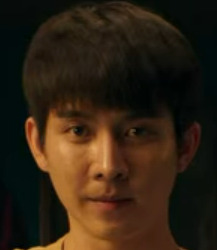
Wan: (Deceased) Dancer. Friends with Khem. Forced by circumstances to become a spy and dancer at Man Suang. Experienced PTSD related to the death of his sister, Waen. Wan was killed by Khem to prevent him from burning down Man Suang.
~~~
MAJOR POLITICAL PLAYERS

Phraya Bodisorn: Gave Khem and Chat the mission to find the secret documents to prove Wichiendej and Cheng were trafficking weapons for rebellion. Also is dealing arms with Europe himself. Uncle to Muen Kijraksa.
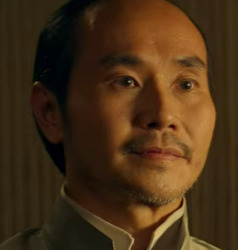
Tiang: (Deceased) Son of Cheng’s friend/business partner and sworn brother. He referred to Cheng as Uncle. Served Wichiendej. Plotted to kill Hong. Took over Man Suang after Hong faked his death. Killed Cheng. Was killed by Hong for murdering Hong’s father Cheng.
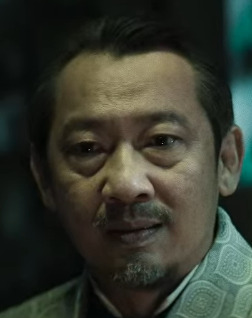
Suthinborirak (Khun): (Deceased) (Shortened name “Khun Suthin” was also used.) Registrar for the Harbor Department. He was a broker negotiating for arms dealers. Was referred to as “European dealers’ henchmen.” Turned up dead outside of Man Suang. Father to Chatra.
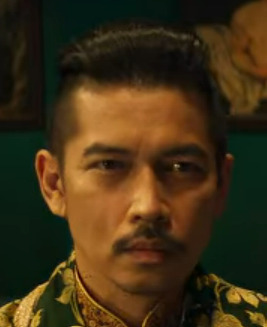
Wichiendej (Phraya): (Shortened name “Wichien” was also used.) Lord/leader of the Harbor Department. Supposedly working with Cheng to traffic weapons from Europe.
~~~
MINOR CAST
Cheng: (Deceased) Owner of Man Suang. Stored weapons for Wichiendej but did not want to take part in planning war/rebellion. Built Man Suang to be a paradise. Was in the process of returning the weapons to Wichien. Assassinated by Tiang.
Erb (Aunt): Saw Khun Suthin the night he died and claimed he spoke with a tall person.
Jaeng: Escorted Khem and Wan into Man Suang and reminded them of their mission.
Joo (Aunt): One of the aunties at Man Suang. Got bitten by the parrot when feeding it.
Jun: Harassed a female prostitute and got scolded by Hong and his master, Phraya Wichiendej.
Muen Kijraksa: (Deceased) Assassinated while in the midst of a private tryst with Khem. Nephew to Phraya Bodisorn.
Phikul (Madam): Man Suang dance troupe leader/instructor.
Phit (Aunt): Saw Khun Suthin the night he died and claimed he bent down and talked with a child.
Ruang: Chatra’s cat, later given to Khem.
Thiang: (Note: Not to be confused with Tiang.) Member of Man Suang. Picked fights with Khem.
Thongmak (Uncle): An older member of Man Suang. Married to one of the aunties of Man Suang. Saw Khun Suthinborirak the night he died by looking in the reflection of a halberd.
Tua Hia: (Not a person.) A gang association of Chinese members.
Tubtim: Head/lead prostitute at Man Suang. Inherited wealth from her late husband. Was sold to Khun Phra as a mistress. (It's unclear whether Khun Phra was the same aforementioned husband.)
Waen: (Deceased) Was Wan’s sister. Was raped and killed, allegedly by Chinese immigrants.
Yuean (Aunt): One of the aunties of Man Suang. Claimed she saw a ghost wearing a red breast cloth who spoke with Khun Suthinborirak.
66 notes
·
View notes
Text
How to study languages without studying
Whether you're just starting out and have had bad experiences with textbook learning in the past or are getting burnt out from prepping for the next proficiency test, it's never a bad idea to put the textbooks away for a time and just enjoy your target language. If you're new to the world of immersion, here are a few ways to get you started.
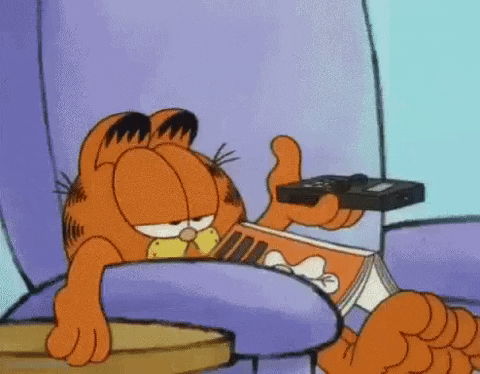
Follow along with the lyrics of a song. Spotify's not-so-new-anymore lyrics feature is great for this, especially since it has timed lyrics, but it doesn't have every song.
Expert mode: Write out the lyrics and underline/highlight/make note of all the words and grammar structures you don't know. Learn these unknowns until you can understand the whole song!
Extra challenge: Translate a song from your target language. I usually tend to stay away from translations in my study, but for those of you who aspire to be translators (or already are!), the poetic nature of song lyrics can be a fun challenge.
Watch a show or movie. Netflix has now introduced a feature where you can sort by language! If there's nothing made in your language that you're interested in, it also gives the option to sort by shows and movies that have the audio or subtitles available. Internet Archive also tends to have lots of foreign films that I'm looking for.
Easy mode: Watch with English or your native language subtitles. When doing this, try to still listen to what's being said and pick up on words and phrases that you know, or match new words with their translation in the subtitles. Note: reading one language and listening to another is a skill in and of itself! Don't be discouraged if you can't do both at the same time yet, you're brain is still making the connections in intonation and cadence of the language.
Hard mode: Watch with captions in your target language. This helps you connect listening and reading, especially in languages where the spelling isn't exactly phonetic, or it uses a different alphabet than what you're used to.
Expert mode: No captions or subtitles! But who knows, maybe you're better at listening comprehension than I am. Make sure you're getting comprehensible input here; some shows and movies are much harder than others. But above all else, watch what keeps your interest. A movie where you can catch half the dialogue but is super engaging is better for you than an "easy" movie that you're going to spend your time ignoring.
Polyglot mode?: Watch something in your target language with subtitles in a different target language. This adds just one too many layers of obfuscation for me, but if you're into the challenge, more power to you.
Watch YouTube. You can change your language preference on YouTube, and with that, the Explore section will give you recommendations in your target language. Going into the trending tab with your target language can give you a good idea about what people are interested in in the countries where your target language is spoken.
Read something. It can be a book, it can be a comic. There are plenty of webcomics out there in a number of languages! There's also probably an English language listicle with recommendations of easier to understand webcomics for learners, too.
If you're just getting started in immersion, you can choose whether you focus on intensive reading or extensive reading (this actually goes for all kinds of immersion, but is easiest to control with reading since it happens at your own pace). Intensive reading is reading with the goal of understanding everything 100%. If you don't understand a word, or a grammar point, or the reading of a character, look it up. Extensive reading is reading just to get the gist of things. Look up words and grammar points only if they stop you from understanding the general meaning of the sentence or section. And of course, the more you immerse, the less you'll have to look things up, but remember that difficulty varies between materials, even within books of the same age range, genre, and medium.
A small digression: If you decide that you never want to open a textbook on your language learning journey, more power to you! It can be done and I know people who have gotten to proficient levels of their target language without textbooks. If you want this to be you, extensive immersion is your best friend. You also might want to get comfortable with the flashcard program anki, because, if this is your goal, all those unknown grammar points and words will probably end up there. But at the end of the day, language learning is an intensely personal journey, and what works for others won't necessarily work for you. Finding what works for you is just part of learning a language.
Play a game. Lots of games are region locked (hint: Pokemon Sun/Moon isn't! If you start a new game, you can choose which language you want to play it in), but there are plenty of free online games still lurking in the corners of the internet. With a bit of googling, you can probably find something in your target language. Just the other day, I went out to find one of those hidden item games in Japanese and ended up finding an entire site dedicated to user made browser games.
If you're learning Japanese or Korean, picrew might be fun to look through as well. I noticed that plenty of picrews have basic anatomy vocabulary. I'm not super familiar with picrew myself, but the ones I've seen tend to be in Korean and Japanese
And lastly, don't fully give up on textbooks before trying them out. Don't be discouraged if textbooks truly aren't your thing, but studying a language on your own time can feel much different than studying for school. Don't put too much pressure on yourself and just have fun with your language. Additionally, if you'd rather learn in a video format, many languages have full courses uploaded to YouTube for you to try. Finding these can be difficult for some languages though, so don't hesitate to reach out to other learners and see what they recommend!
Got your materials ready? Great! Now go forth and immerse!
#inspired by someone's langblr intro post where they talked about hating studying#studying a language doesnt need to feel like studying#okay has anyone noticed that tumblr's post maker is broke as fuck right now#im having to rewrite so much because it keeps deleting my shit#langblr#language learning#polyglot#studyblr#studyspo#studying#benkyou posting#endangered and small language learners im sorry i got nothing youre stronger than me
93 notes
·
View notes
Text


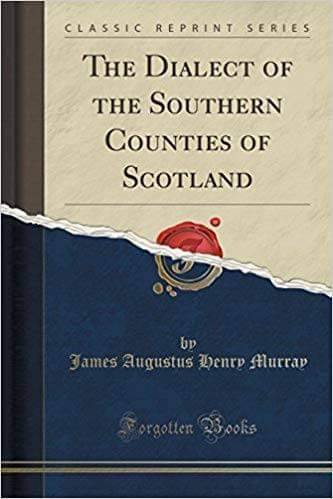
February 7th 1837 saw the birth of James Murray, first editor of the Oxford English Dictionary.
A couple of things that I love about this, 1; a Scot was the first editor of the most famous English dictionary, a 2; the picture of Murray, he just looks the part!
He was certainly something of a prodigy as a child, despite his humble background. Born in the Borders village of Denholm, near Hawick, the son of a tailor, he reputedly knew his alphabet by the time he was eighteen months old, and was soon showing a precocious interest in other languages, including—at the age of 7—Chinese.
Thanks to his voracious appetite for reading, and what he called ‘a sort of mania for learning languages’, he was already a remarkably well-educated boy by the time his formal schooling ended, at the age of 14, with a knowledge of French, German, Italian, Latin, and Greek, oh and of course Gaelic, along with a range of other interests, including botany, geology, and archaeology. After a few years teaching in local schools—he was evidently a born teacher, and was made a headmaster at the age of 21—he moved to London, and took work in a bank.
e soon began to attend meetings of the London Philological Society, and threw himself into the study of dialect and pronunciation—an interest he had already developed while still in Scotland—and also of the history of English. In 1870 an opening at Mill Hill School, just outside London, enabled him to return to teaching. He began studying for an external London BA degree, which he finished in 1873, the same year as his first big scholarly publication, a study of Scottish dialects which was widely recognized as a pioneering work in its field and was the first ever sustained history of the Scots tongue.
Only a year later his linguistic research had earned him his first honorary degree, a doctorate from Edinburgh University: quite an achievement for a self-taught man of 37.
In 1876 Murray was approached by the London publishers Macmillans about the possibility of editing a dictionary, he accepted the challenged and it was generally thought the publication would take around ten years to complete and run to 6,400 pages, in four volumes, he undertook the work while still teaching at Mill Hill, although he did enlist help in several assistants.
Five years later- no- he hadn't finished it, he was a genius but not that much, they published the first volume, A-Ant, to steal the words from a future film, they were going to need a bigger book!" The team sent out the call for volunteers all across the country. one American man, William Chester Minor, even responded from his prison cell in Broadmoor while serving a life sentence for murder. still suffered from paranoid delusions, some saw his work on the Oxford English Dictionary as a form of therapy. Minor became a regular collaborator with Murray as he sent his notes to the editor every week for 20 years. Every letter Minor signed with the closing, “Broadmoor, Crowthorne, Berkshire.
Murray soon had to give up his school teaching, and moved to Oxford in 1885; even then progress was too slow, and eventually three other Editors were appointed, each with responsibility for different parts of the alphabet. Although for more than three-quarters of the time he worked on the OED there were other Editors working alongside him—he eventually died in 1915—and although he had a staff of assistants helping him, it is without question that he was the Editor of the Dictionary.
It was not until 1928 that C. T. Onions and William Craigie finally finished the main text. In terms of the methodology he developed, The Oxford English Dictionary is largely Murray's creation; as the ‘Historical Introduction’ to the OED states, ‘to Murray belongs the credit for giving it, at the outset, a form which proved to be adequate to the end’.
In his private life Murray married an Ada Agnes Ruthven and they found time to have 11 children together, all of whom reached adulthood, and unusual occurrence back then. Some even helped him in the compilation of the OED. The third pic is great and shows him astride a huge ‘sand-monster’ constructed on the beach during one of the family’s holidays in North Wales.
He was never made a Fellow of an Oxford college, to their shame, and only received an Oxford honorary doctorate the year before his death.He died of pleurisy on 26 July 1915 and requested to be buried in Oxford beside the grave of his best friend, James Legge.
32 notes
·
View notes
Text
hunting dogs as dark humour jokes bc why not
Jouno: Never break someone's heart, they only have one
Jouno: Break their bones instead. They have 206 of them.
Tachihara: A man walks into a magic forest and tries to cut down a talking tree. "You can't cut me down," the tree complains. The man responds, "You may be a talking tree but you will dialogue."
Tecchou: What's a pirate's favorite letter of the alphabet?
Jouno: None. Historians have suggested most pirates would have been illiterate.
Teruko: What's the last thing to go through a fly's head as it hits the windshield of a car going 70 km per hour? ITS BUTT
Fukuchi: My favorite Disney film is The Hunchback of Notre Dame. I love a protagonist with a twisted backstory.
Tecchou: I threw a boomerang a few years ago. Now I live in constant fear.
Tecchou: I have a fish that can breakdance. Just for 20 seconds though, and only once.
Jouno: I was watching my daughter at the park earlier. Another parent asked me which one was mine. I replied, "I'm still deciding." They looked horrified.
Fukuchi: Why do vampires seem sick? They're always coffin!
Bram: 🕴
Teruko: What's the difference between jelly and jam? You can't jelly a body into the trunk of a car!
Fukuchi: Today, I asked my phone, "Siri, why am I still single?" and it activated the front camera.
Tecchou: Don't challenge Death to a pillow fight. Unless you're prepared for reaper cushions.
Tecchou: Mom died when I couldn't remember her blood type. As she died, she kept telling me to "be positive", but it's hard without her.
Jouno: Want to know how you could make any salad into a caesar salad? Stab it twenty-three times.
Tachihara: Give a man a match, and he'll be warm for a few hours. Set him on fire and he will be warm for the rest of his life.
Teruko: The doctor gave me one year to live, so I shot him with my gun. The judge gave me 15 years. Problem solved.
Fukuchi: Where did Joe go after getting lost on a minefield? Everywhere!
Jouno: My grandfather Fukuchi said my generation relies too much on the latest technology. So I unplugged his life support.
Tachihara: I have a stepladder because my real ladder left when I was 5.
Teruko: They laughed at my crayon drawing. I laughed at their chalk outline.
Tecchou: The other day, Jouno asked me to pass his lipstick but I accidentally passed him a glue stick. He still isn't talking to me.
Teruko: I have the heart of a lion and a lifetime ban from the zoo.
Jouno: Why is it that if you donate a kidney, people love you, but if you donate five kidneys, they call the police!
Fukuchi: Dark humour is like food. Not everyone gets it.
Tecchou: I was drinking a glass of soy sauce and the waitress screamed "does anyone know CPR?" I yelled, "I know the entire alphabet" and we all laughed and laughed. Well, except one person.
Tachihara: I told my father that I had an imaginary girlfriend. He sighed and said, "you know, you could do a lot better". "Thanks dad," I said. He shook his head and went, "I was talking to your girlfriend."
BONUS:
Nikolai: I was digging in our garden and found a chest full of gold coins. I wanted to run straight home to tell Fyodor about it, then I remembered why I was digging in our garden.
18 notes
·
View notes
Text
The 100 Favorite Movies Challege
As a huge movie buff, I thought I'd try something fun on here. I have decided to launch a new internet challenge: "The 100 Favorite Movies Challenge". The rules are pretty simple and straight forward. You create a list of 100 of your personal favorite movies in alphabetical order, post the list on your home page, then nominate other people/users of your choosing to do the challenge.
There is no limit to what movies can be included on your list. Films within any medium (live action or animated), genre, and decade are more than welcome. Whether it's longtime favorites you were introduced to when you were younger, favorites that you've picked up over the years, or recent discoveries or releases that quickly became your favorites, anything and everything is on the table here.
I'll start off by sharing my list. To be clear, I have way more than 100 favorite movies, but to have the number be anything past that may be a bit much for some people. Please don't judge me if it seems like there might be a few noteworthy titles missing on here. I mainly put this list together just for fun. Alright, here we go!
9 (2009)
Airplane! (1980)
American Graffiti (1973)
Atlantis: The Lost Empire (2001)
The Avengers (2012)
Avengers: Endgame (2019)
Baby Driver (2017)
Batman Begins (2005)
Beetlejuice (1988)
Beverly Hills Cop (1984)
Big Hero 6 (2014)
Black Dynamite (2009)
The Blues Brothers (1980)
Broadway Melody of 1940 (1940)
Captain America: The First Avenger (2011)
Castle in the Sky (1986)
Chicago (2002)
Cowboy Bebop: The Movie (Knockin' on Heaven's Door) (2001)
Deadpool (2016)
Death Proof (2007)
Desperado (1994)
Die Hard (1988)
Django Unchained (2012)
Double Indemnity (1944)
Dragon Inn (1967)
Fantasia 2000 (2000)
Fantastic Mr. Fox (2009)
Flash Gordon (1980)
Ghostbusters (1984)
The Godfather (1972)
Goodfellas (1990)
The Good, the Bad and the Ugly (1966)
The Grand Budapest Hotel (2014)
Guardians of the Galaxy (2014)
History of the World, Part 1 (1980)
Hot Fuzz (2007)
How to Train Your Dragon 2 (2014)
The Incredibles (2004)
Independence Day (1996)
Indiana Jones and the Last Crusade (1989)
Inglourious Basterds (2009)
The Italian Job (2003)
Jaws (1975)
John Wick: Chapter 3 - Parabellum (2019)
Jurassic Park (1993)
Logan (2017)
Lupin the 3rd: The Castle of Cagliostro (1980)
Mad Max: Fury Road (2015)
Meatballs (1979)
Men in Black (1997)
Moana (2016)
Monsters vs. Aliens (2009)
Moonrise Kingdom (2012)
Mr. and Mrs. Smith (2005)
The Muppet Christmas Carol (1992)
National Lampoon's Animal House (1978)
Network (1976)
The Nightmare Before Christmas (1993)
North by Northwest (1959)
Notorious (1946)
Once Upon a Time in Hollywood (2019)
The Outlaw Josey Wales (1976)
Pirates of the Caribbean: The Curse of the Black Pearl (2003)
Porco Rosso (1992)
Princess Mononoke (1997)
Pulp Fiction (1994)
Raiders of the Lost Ark (1981)
Ready Player One (2018)
Rear Window (1954)
Rio Bravo (1959)
Robin Hood (1973)
The Rocketeer (1991)
Romeo and Juliet (1968)
Scream (1996)
Seven Samurai (1954)
Shaun of the Dead (2004)
Sherlock Holmes (2009)
Skyfall (2012)
Smokey and the Bandit (1977)
Spaceballs (1987)
Spider-Man: Into the Spider-Verse (2018)
Spirited Away (2001)
Star Wars: A New Hope (1977)
Star Wars: The Empire Strikes Back (1980)
Star Wars: Return of the Jedi (1983)
The Suicide Squad (2021)
Surf's Up (2007)
Talladega Nights: The Ballad of Ricky Bobby (2006)
The Thin Red Line (1998)
Tombstone (1993)
Top Gun: Maverick (2022)
Treasure Planet (2002)
Tremors (1990)
Tron: Legacy (2010)
Walk Hard: The Dewey Cox Story (2007)
The Wind Rises (2013)
Wonder Woman (2017)
Yojimbo (1961)
Young Frankenstein (1974)
Zombieland (2009)
Now, before I wrap things up, I would like to nominate @skygent, @is0gild , @firecraker-j, @mrcowboytoyou, and @piglets-not-so-big-adventure to do this challenge. Hopefully we can get the ball rolling so more and more people can join in. I look forward to seeing what kind of lists you guys will put together. Good luck!
#internet challenge#favorite#movies#100#list#invite#fun#personal favorites#too many movies to tag#mediums#live action#animation#genres#years and decades of films
5 notes
·
View notes
Text
By: Michael Shermer
Published: Mar 22, 2016
The French political journalist and supporter of the Royalist cause in the French Revolution, Jacques Mallet du Pan, famously summarized what often happens to extremists: “the Revolution devours its children.” I was thinking about this idiom—and its doppelgänger “what goes around comes around”—while writing a lecture for a talk I was invited to give at my alma mater California State University, Fullerton on the topic: “Is freedom of speech harmful for college students?” The short answer is an unflinching and unequivocal “No.”
Why is this question even being asked? When I was in college free speech was the sine qua non of the academy. It is what tenure was designed to protect! The answer may be found in the recent eruptions of student protests at numerous American colleges and universities, including Amherst, Brandeis, Brown, Claremont McKenna, Oberlin, Occidental, Princeton, Rutgers, University of California, University of Missouri, Williams, Yale, and others. Most of these paroxysms were under the guise of protecting students from allegedly offensive speech and disagreeable ideas—defined differently by different interest groups—with demands for everything from trigger warnings and safe spaces to microaggressions and speaker disinvitations.
Between the 1960s and the 2010s, what went wrong?
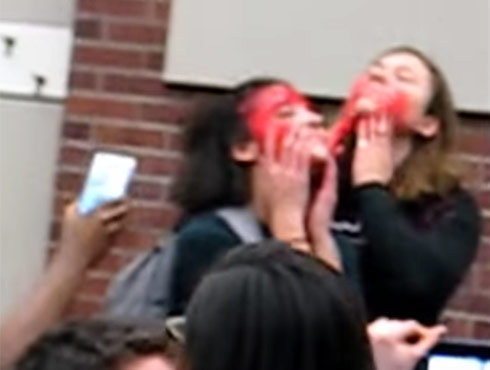
[ Students at Rutgers University protest a talk by Milo Yiannopoulos by smearing red on their faces and shouting “hate” when he challenged them to hear other points of view. ]
The Problem
Trigger warnings are supposed to be issued to students before readings, classroom lectures, film screenings, or public speeches on such topics as sex, addiction, bullying, suicide, eating disorders, and the like, involving such supposed prejudices as ableism, homophobia, sizeism, slut shaming, transphobia, victim-blaming, and who-knows-what-else, thereby infantilizing students instead of preparing them for the real world where they most assuredly will not be so shielded. At Oberlin College, for example, students leveled accusations against the administration of imperialism, white supremacy, capitalism, and the ne plus ultra in gender politics, cissexist heteropatriarchy, the enforcement of “gender binary and gender essentialism” against those who are “gender variant (non-binary) and trans identities.” The number of such categories has expanded into an alphabet string, LGBTQIA, or lesbian, gay, bisexual, trans, queer/questioning, intersex, asexual and any other underrepresented sexual, gender, and/or romantic identities.1 This is not your parents’ protest against Victorian sexual mores, and the list of demands by Oberlin students would be unrecognizable to even the most radical 60’s hippies:
The creation of a school busing system for Oberlin, Ohio’s K–12 schools, paid for by the college.
The establishment of special, segregated black-only “safe spaces” across campus.
A more inclusive audition process in the Conservatory that does not privilege Western European theoretical knowledge over playing ability.
The creation of a bridge program that will recruit recently-released prisoners to enroll at Oberlin for undergraduate courses.
The most audacious demand was “an $8.20/hour stipend for black student leaders who are organizing protest efforts.” These students wanted to be paid for protesting!
As often happens in moral movements, a reasonable idea with some evidentiary backing gets carried to extremes by engaged moralists eager for attention, sympathy, and the social standing that being a victim or victim sympathizer can bring. Soldiers suffering from PTSD, for example, may be “triggered” by the backfire of a nearby automobile, but no one has proposed that automobile manufacturers put “trigger warnings” on cars to accommodate soldiers. As well, the Harvard psychologist Richard McNally points out that trigger warnings may have the opposite effect for which they are intended, because “systematic exposure to triggers and the memories they provoke is the most effective means of overcoming the disorder.” McNally sites an analysis by the Institute of Medicine, which found that “exposure therapy is the most efficacious treatment for PTSD, especially in civilians who have suffered trauma such as sexual assault.” In other words, face your problems head-on and deal with them. An additional problem with trigger warnings is that the number of triggers has expanded to the point where nearly every speech and lecture could contain triggering words, turning communication into a moral hazard. Finally, who determines what is “triggering” anyway? The very concept is a recipe for censorship.
Safe space, according to the organization Advocates for Youth, is “A place where anyone can relax and be fully self-expressed, without fear of being made to feel uncomfortable, unwelcome or challenged on account of biological sex, race/ethnicity, sexual orientation, gender identity or expression, cultural background, age, or physical or mental ability; a place where the rules guard each person’s self-respect, dignity and feelings and strongly encourage everyone to respect others.” Some such places even contain pillows, soothing music, milk and cookies, and videos of puppies.
In addition to infantilizing adults, this practice often means protecting students from opinions that they don’t happen to agree with, or shielding them from ideas that challenge their beliefs, which has always been one of the most valuable benefits of a college education. In any case, college campuses, along with the cities and states they’re in, are already designed to be safe from violence and discrimination based on the rule of law enforced by the police and courts. In point of fact, most of these colleges nestled in American cities are among the safest places on earth. If you want to build a safe space for people who really need it, go to Syria or Somalia. And if this opinion triggers you or makes you feel unsafe then you haven’t been paying attention to what’s going on in the world.
Microaggressions are comments or questions that slight, snub, or insult someone, intentionally or unintentionally, in anything from casual conversation to formal discourse. According to the University of California publication Tool: Recognizing Microaggressions and the Messages They Send, examples include:
Asking, “Where are you from or where were you born?” or “What are you?” This implies someone is not a true American.
Inquiring, “How did you become so good in math?” (to people of color) or suggesting “You must be good in math” (to an Asian), which is stereotyping.
Proclaiming, “There is only one race, the human race” or “I don’t believe in race.” This denies the significance of a person of color’s racial/ethnic experience and history.
Opining, “I believe the most qualified person should get the job” or “America is the land of opportunity.” This suggests that the playing field is level, so if women or people of color do not fill all jobs and careers in precise proportion to their population percentages, it must mean that the problem is with them, or that they are lazy or incompetent and just need to work harder.

[ Tool: Recognizing Microaggressions and the Messages They Send (click image to enlarge) ]
Yes, language matters, and some comments that people make are cringe worthy (e.g., saying “you people” to a group of African Americans, or “you’re a girl, you don’t have to be good at math”). But do we really need a list of DOs and DON’Ts handed out to students and reviewed like they were five-year olds being taught how to play nice with the other kids in the sandbox? Can’t adults work out these issues themselves without administrators stepping in as surrogate parents? And who determines what constitutes “hate,” “racist” or “sexist” speech? Who it happens to bother or offend? Students? Faculty? Administration? And as with the problem of trigger words, the list of microaggressions grows, turning normal conversation into a cauldron of potential violations that further restricts speech, encourages divisiveness rather than inclusiveness, and forces people to censor themselves, dissemble, withhold opinion, or outright lie about what they believe.
An incident at Brandeis University in 2015 is instructive: when Asian American students installed an exhibition on microaggressions, other Asian American students claimed that the exhibit was itself a microaggression that triggered negative feelings, leading the president to issue an apology to anyone “triggered or hurt by the content of the microaggressions.” Agreed, blurting out “Why do you Asians always hang out together” is lame, but at this point in history it just makes the communicant sound more like a bore than a bigot, and more deserving of eye rolls than public humiliation.
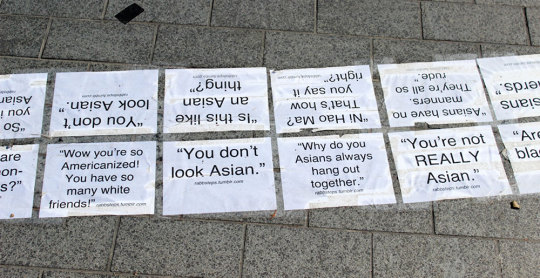
[ Brandeis University microagression display, later declared a microagression (click image to enlarge) ]
Speaker disinvitations—cancellations of invited speakers—have been accelerating over the past decade. According to the Foundation for Individual Rights in Education (FIRE), 257 such incidents have occurred since 2000, 111 of which were successful in preventing the invited guests from giving their talks. In 2014, for example, Ayaan Hirsi Ali was invited to give the commencement speech at Brandies University, where she was to also receive an honorary doctorate. After students protested, citing her criticism of Islam for its mistreatment of women, the administration caved into their demands and Ali was no-platformed (as it is called in England). Worse, in this theater of the absurd, students from U.C. Berkeley attempted to no-platform the comedian and social commentator Bill Maher for his alleged “Islamophobia,” code for anyone who criticizes Islam for any reason. Maher delivered his commencement oration nonetheless, telling the very liberal student body that “Liberals should own the First Amendment the way conservatives own the Second Amendment,” pointing out that apparently irony is no longer taught at this birthplace of the 1960’s free speech movement. This was topped by students at Williams College who, in October 2015, succeeded in disinviting Suzanne Venker, author of The Flipside of Feminism. Venker was invited to participate in the college’s “Uncomfortable Learning” lecture series but, well, she made some students feel too uncomfortable. “When you bring a misogynistic, white supremacist men’s rights activist to campus in the name of ‘dialogue’ and ‘the other side,’” whined one student on Facebook, it causes “actual mental, social, psychological, and physical harm to students.” Physically harm?
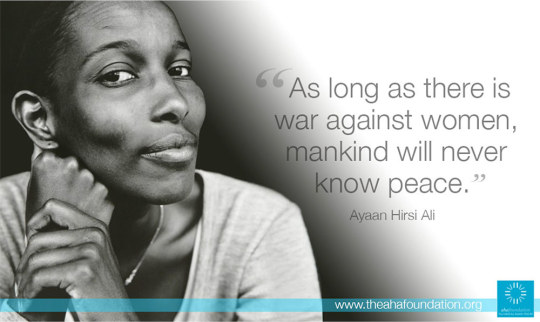
[ Banner from the website of Ayaan Hirsi Ali ]
The effects of such protests are often the opposite of what the protesters sought. Ayaan Hirsi Ali’s speech, for example, was printed in the Wall Street Journal where it was seen by that paper’s 2.37 million readers, many orders of magnitude more than would have heard it on campus. Bill Maher turned his Berkeley brouhaha into a bit for his HBO television show Real Time, which carries over four million viewers. More irony.
What may have started out as well intentioned actions at curbing prejudices and attenuating bigotry with the goal of making people more tolerant, has now metamorphosed into thought police attempting to impose totalitarian measures that result in silencing dissent of any kind. The result is the very opposite of what free speech and a college education is all about.
Why such unrest in the academy—among the most liberal institutions in the country—surrounded as these students are by so many liberal professors and administrators? Here I will offer five proximate (immediate) causes, one ultimate (deeper) cause, and some solutions.
Proximate Causes
1. Moral Progress
As I document in The Moral Arc, we have made so much moral progress since the Enlightenment—particularly since the civil rights and women’s rights movements that launched the modern campus protest movement in the first place—that our standards of what is tolerable have been ratcheted ever upward to the point where students are hypersensitive to things that, by comparison, didn’t even appear on the cultural radar half a century ago. This progress has happened gradually enough on the news cycle measure of days and weeks to be beneath the awareness of most observers, but fast enough that it can be tracked on time scales ranging from years to decades. For example, remember when interracial marriage was a divisive debate? Me neither. But recall the now-jarring words of the trial judge Leon M. Bazile, who convicted Richard and Mildred Loving in the case (Loving v. Virginia) that ultimately made its way to the Supreme Court in 1967 and overturned laws banning interracial marriage: “Almighty God created the races white, black, yellow, malay and red, and he placed them on separate continents. The fact that he separated the races shows that he did not intend for the races to mix.” Same-sex marriage went through a similar evolution as interracial marriage, culminating in the 5–4 decision by the Supreme Court of the United States in 2015 to make same-sex marriage the law of the land, another data point in the long-term trend toward granting more rights to more people.
Interracial marriage and same-sex marriage are themselves the legacy of the rights revolutions that first took off in the late 1700s when the idea of rights was invented and then demanded, first in the American Revolution (starting with the Declaration of Independence in 1776), then in the French Revolution (with the Declaration of the Rights of Man and of the Citizen in 1789), inspiring subsequent rights revolutions and documents (for example, Declaration of the Rights of Woman in 1791). The result, two and a half centuries later, has been the abolition of slavery, the eradication of torture, the elimination of the death penalty in all modern democracies save America, the franchise for all adult citizens, children’s rights, women’s rights, gay rights, animal rights, and even the rights of future generations to inhabit a livable planet. Who knows, perhaps one day soon we’ll even grant rights to Artificially Intelligent robots. In other words, most of the big moral movements have been fought and won, leaving today’s students with comparatively smaller causes to promote and evils to protest, but with moral emotions just as powerful as those of previous generations, so their outrage seems disproportionate.
2. Transition from a Culture of Honor to a Culture of Victimhood
In a culture of honor one settles minor disputes oneself and leaves the big crimes to the criminal justice system. Over the past two decades this has been eroded and is being replaced by a culture of victimhood in which one turns to parent-like authorities (faculty and college administrators, but not the law) to settle minor disputes over insults and slights.2 The culture of honor leads to autonomy, independence, self-reliance, and self-esteem, whereas the culture of victimhood leads to dependence and puerile reliance on parental figures to solve ones’ problems. In this victimhood culture the primary way to gain status is to either be a victim or to condemn alleged perpetrators against victims, leading to an accelerating search for both.3 A student at the University of Oxford named Eleanor Sharman explained how it happened to her after she joined a campus feminist group named Cuntry Living and started reading their literature on misogyny and patriarchy:
Along with all of this, my view of women changed. I stopped thinking about empowerment and started to see women as vulnerable, mistreated victims. I came to see women as physically fragile, delicate, butterfly-like creatures struggling in the cruel net of patriarchy. I began to see male entitlement everywhere.
As a result she became fearful and timid, afraid even to go out to socialize:
Feminism had not empowered me to take on the world—it had not made me stronger, fiercer or tougher. Even leaving the house became a minefield. What if a man whistled at me? What if someone looked me up and down? How was I supposed to deal with that? This fearmongering had turned me into a timid, stay-at-home, emotionally fragile bore.
It is not that there are no longer real victims of actual crimes, but it is a disservice to them to equate the trivial peccadillos of microaggressions or triggering words with brutal rapes and murders. A feminist named Melody Hensley, for example, who was once the Executive Director of the Center for Inquiry in Washington DC. claims that years of online stalking and social media trolls gave her PTSD on par with that of combat soldiers, disabling her from being able to work. Not surprisingly, war vets were not sympathetic.
3. From Anti-Fragile to Fragile Children
One response to the 1970s and 1980s crime wave was a shift toward “helicopter parenting” in which children were no longer allowed to be, well, children. The social psychologist Jonathan Haidt explains why through the concept of anti-fragility: “Bone is anti-fragile. If you treat it gently, it will get brittle and break. Bone actually needs to get banged around to toughen up. And so do children. I’m not saying they need to be spanked or beaten, but they need to have a lot of unsupervised time, to get in over their heads and get themselves out. And that greatly decreased in the 1980s. Anxiety, fragility and psychological weakness have skyrocketed in the last 15–20 years.” Those kids are today’s college students, and as a consequence they have brittle bones and thin skins. An example of an anti-fragile person with strong bones and thick skin is the model Isabelle Boemeke, who tweeted what she does when verbally harassed on the streets by ogling men:
Here’s what I do when catcalled: roll my eyes, if he’s Hispanic say “chinga tú madre!”, put earphones on, continue with life.
— Isabelle Boemeke (@isaboemeke) February 10, 2016
4. Puritanical Purging
Social movements tend to turn on themselves in puritanical purging of anyone who falls short of moral perfection, leading to preemptive denunciations of others before one is so denounced. The witch crazes of the 17th century degenerated into such anticipatory condemnations, resulting in a veritable plethora of nonexistent sorceresses being strapped to faggots and torched. The 20th century witnessed Marxist and feminist groups undergoing similar purges as members competed for who was the purist and defenestrated those who fell below the unrealizable standard. On the other side of the political spectrum, Ayn Rand’s objectivist movement took off in a frenzied build up after the publication of Atlas Shrugged in 1959, but by the time the philosopher-novelist died in 1982 most of the insider “collective” had been expunged for various sins against the philosophy, from listening to the wrong music to challenging the founder on any point of substance or minutia. Such purification purges are among the worst things that can happen to a social movement.

[ Pre-emptive denunciations lead to witch hunts. ]
5. Virtue Signaling
Related to puritanical purging is virtue signaling, in which members of a movement compete to signal who is the most righteous by (A) recounting all the moral acts one has performed and (B) identifying all the immoral acts others have committed. This leads to an arms-race to signal moral outrage over increasingly diminishing transgressions, such as unapproved Halloween costumes at Yale University, which led to a student paroxysm against a faculty member, a cell-phone video of which went viral and nearly brought the campus to a stand still. This is an example of what Maajid Nawaz means by “regressive liberalism,” where freedom of speech and expression are sacrificed in the name of tolerance, which is actually intolerance. One of the first acts of totalitarian regimes is to restrict dissent and free speech, so perhaps it should be called totalitarian liberalism.
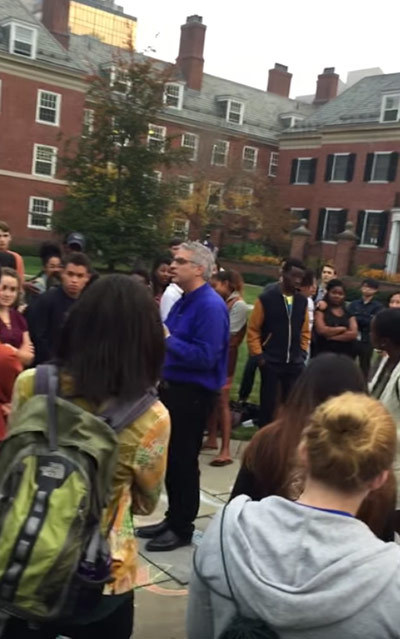
[ Yale college master Nicholas Christakis (in blue shirt) is verbally assaulted by a student who accused him of not doing enough to censor the wearing of Halloween costumes that could be seen as offensive. “Who the fuck hired you?” the girl with the backpack screamed at the professor. ]
An Ultimate Cause
A deeper reason behind the campus problem is a lack of diversity. Not ethnic, race, or gender diversity, but viewpoint diversity, specifically, political viewpoint. The asymmetry is startling. A 2014 study conducted by UCLA’s Higher Education Research Institute found that 59.8 percent of all undergraduate faculty nationwide identify as far left or liberal, compared with only 12.8 percent as far right or conservative. In a 2015 study published in Behavioral and Brain Sciences Arizona State University psychologist José Duarte and his colleagues reported that 58–66 percent of social science professors identify as liberals, compared to only 5-8 percent as conservatives. Given the power of beliefs to drive actions, college students today stand next to no chance of receiving a balanced education on the most important topics of our time and for which social science is best equipped to study.
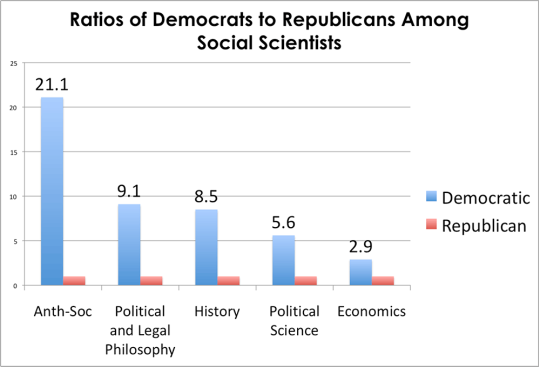
[ This graph captures the political bias problem well. From: Klein, Daniel B. and Charlotte Stern. “Professors and Their Politics: The Policy Views of Social Scientists.” Critical Review, 17, p. 264. (click image to enlarge) ]
What goes around comes around. Today’s liberal college professors were radical college students in the 1960s and 1970s, protesting “the man” and bucking authority. One reason faculty and administrators are failing to stand up to student demands today is that they once wore those shoes. Raising children and students to be dismissive of law and order and mores and manners leads to a crisis in consciousness and the rejection of the very freedoms so hard won by their parents and teachers. A generation in rebellion gave birth to a generation in crisis. Thus it is that the revolution devours its children.
Solutions
There is no magic bullet solution to the problems the academy faces today, but as liberals have known for some time it takes decades—even generations—to right the wrongs of the past, so solutions are likely to be incremental and gradual, which is almost always a good thing when it comes to social change, as it leads to less violent and more peaceful actions on the part of both activists and their opponents. Contra Barry Goldwater, extremism in the defense of liberty is no virtue; moderation in the pursuit of justice is no vice.4
Hiring practices fall under this rubric. If the academy is already comfortable with and active in seeking to diversify its faculty by ethnicity, race, and gender, why not viewpoint as well? Given the entrenchment of tenure this will take time, but as that scribe of moral progress Victor Hugo observed, “Nothing is more powerful than an idea whose time has come.”5
In the meantime, viewpoint diversity can be increased almost overnight by inviting speakers from a wide range of perspectives—political, economic, and ideological—even if (or especially) if they are offensive to faculty and students. And no more disinvitations! If you invite someone to speak, honor your word, own your decision, and stand up to the cry bullies (as they’re called in this neologism). The assignment of books and papers for students to read—especially for courses in history, English literature, the humanities, and the social sciences—can and should include authors whose positions are at odds with those of most academicians and student bodies. And professors: in addition to assigning students articles and opinion editorials from the New York Times, give them a few from the Wall Street Journal. Balance The Nation magazine with Reason magazine, The American Prospect with The American Spectator, National Public Radio with Conservative Talk Radio, PBS with Fox News.
Viewpoint diversity, however, is subservient to the deeper principle of free speech, which should be applied indiscriminately across the academy, as it should across society and, ideally, the world. What does free speech mean? First, it does not mean that you can lie about someone. Libel laws are in place to protect people from defamation that causes reputational and financial harm. Second, free speech does not mean that the government, public institutions, or private persons, businesses, or publications are required to promote or publish the opinions of others. As the Publisher of Skeptic magazine, for example, it is not incumbent on me to publish articles or accept advertisements just because we’re in the business of publishing. Institutions should have the freedom to restrict the speech of anyone who utilizes resources within the jurisdiction of its own institution, such as a school newspaper. The government, however, cannot restrict citizens’ speech just because it finds their opinions distasteful, offensive, or critical of its policies. (Exceptions have been made for treason and the passing on of national secrets to enemies, but crying “fire” in a crowded theater was most likely an exception that proves the rule.)
Holocaust deniers, creationists, and 9/11 truthers, for example, should have the right to publish their own journals and books, and to attempt to have their views aired in other publications and media venues, as in college newspapers and web sites, but no one is obligated to publish them. Alex Grobman and I wrestled with the free speech issue in our 2004 book Denying History: Who Says the Holocaust Never Happened and Why Do They Say It? As we opined: “Being in favor of someone’s right to freedom of speech is quite different from enabling that speech.” But we chose to write a book about their movement and arguments, quoting them extensively because, we believe, “In the bright light of open discussion the truth will emerge.”6 And although I declined to publish an ad submitted by a Holocaust denier in Skeptic (running an advertisement in our magazines carries the imprimatur of endorsement), I did debate Mark Weber, the director of the Institute for Historical Review (the leading Holocaust denier organization) in a public forum they hosted.
The freedom of speech has been one of the driving forces behind moral progress because it enables the search for truth. How? There are at least five reasons:7
We might be completely right but still learn something new.
We might be partially wrong and by listening to other viewpoints we might stand corrected and refine and improve our beliefs. No one is omniscient.
We might be completely wrong, so hearing criticism or counterpoint gives us the opportunity to change our minds and improve our thinking. No one is infallible. The only way to find out if you’ve gone off the rails is to get feedback on your beliefs, opinions, and even your facts.
Whether right or wrong, by listening to the opinions of others we have the opportunity to develop stronger arguments and build better facts for our positions. You know that the world is round and goes around the sun, that evolution is real, and that the Holocaust happened. But can you explain how you know these facts? What are the best arguments and evidences for these facts? Could you articulate them clearly and succinctly in a debate or conversation? As John Stuart Mill noted in his classic 1859 work On Liberty: “He who knows only his own side of the case, knows little of that.”
My freedom to speak and dissent is inextricably tied to your freedom to speak and dissent. Once customs and laws are in place to silence someone on one topic, what’s to stop people from silencing anyone on any topic that deviates from the accepted canon? The justification of censorship laws in the consequentialist argument that people might be incited to discrimination, hate, or violence if exposed to such ideas fails the moment you turn the argument around and ask: What happens when it is you and your ideas that are determined to be dangerous? It is the Principle of Interchangeable Perspectives that I introduced in The Moral Arc: For me to expect you to listen to me I must be willing to hear you. If I censor you, why shouldn’t you censor me? If you silence me, why shouldn’t I silence you?
This argument against censorship was well articulated in Robert Bolt’s 1960 play, A Man for All Seasons, based on the true story of the 16th century Chancellor of England, Sir Thomas More, and his collision with King Henry VIII over the monarch’s divorce from Catherine of Aragon. In the play a dialogue unfolds between More and his future son-in-law Roper, who urges him to arrest a man whose testimony could condemn More to death, even though no laws were broken. “And go he should, if he were the Devil himself, until he broke the law!” More entices.
Roper: So now you’d give the Devil benefit of law!
More: Yes. What would you do? Cut a great road through the law to get after the Devil?
Roper: I’d cut down every law in England to do that.
More: Oh? And when the law was down, and the Devil turned round on you—where would you hide, Roper, the laws all being flat? This country is planted thick with laws from coast to coast…and if you cut them down…do you really think you could stand upright in the winds that would blow then? Yes, I’d give the Devil benefit of law, for my own safety’s sake.8
For our own safety’s sake we must grant our devils their due.
#Michael Shermer#academic corruption#student fragility#emotional fragility#censorship#trigger warnings#speech codes#academic freedom#freedom of speech#free speech#academic integrity#long post#religion is a mental illness
16 notes
·
View notes
Text

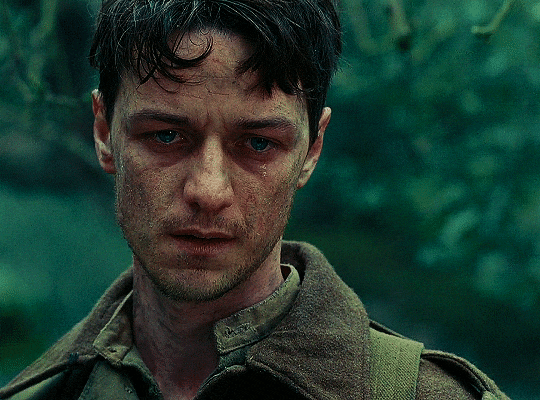
ATONEMENT (2007) dir. Joe Wright
#my gifs.#alphabet film challenge#filmedit#filmgifs#atonementedit#mcavoyedit#perioddramaedit#cinematv#dailyflicks#periodedits#cinemapix#mancandykings#adaptationsdaily#chewieblog#perioddramasource#atonement#james mcavoy#joe wright
579 notes
·
View notes
Text
Run BTS: 037 | BTS Marble Returns
Original Air Date: 23 JAN 2018
Episode Length: 32:42
Total Parts: 1
YouTube English Subtitles: Yes...but about 13 min in, it de-syncs so I'm counting this as a No.
Title Song: Blood Sweat & Tears

Synopsis: Custom BTS board Game full of mini challenges in a Hong Kong hotel room
Production: This is probably the most thorough job the production does at explaining a board game in Run. Everything was well prepared and explained. I'm assuming it's a little dry for non-board -gamers. I had a great time, but I could see how some people wouldn't love this type of episode. There wasn't much innovation to the game overall, it's the kind of content we've seen before.
Endearment: The guys did a good job plying the game and being entertaining and maybe it's just the fact that this is clearly filmed while they're traveling but I almost wish they'd been given rest time instead. Maybe I'm reading too much into it...
Winner: JN
Loser: YG, RM
Best Cheater: I don't think there really were any since they'd asked if it was cool to disturb the other's attempts prior.
Member Moments:
RM: RM actually gave Jin a run for his money with Halli Galli!!
JN: The beginning of Jin as a Halli Galli major!
YG: Yoongi's wise words: it's not easy to get real estate
JH: Nice work Hobi winning!
JM: Jimin's attack during RMs turn at the alphabet game was amazing!
V: Aaah, V's absolute luck at talking everyone into the extra card draw at the end!
JK: JKs iconic kicks of anger!
Bonus Content: No official bonus content but make sure you watch clear to the end to see Yoongi receive his book for the book report!
CQ Rank: 3
youtube
(CQ Eval Date: 04 JAN 2024)
Check out this post for my Masterlist of all episodes and descriptions of how I'm evaluating these.
Previous Episode: 036
Next Episode: 038
#Youtube#bangtan sonyeondan#bts#run bts#ep.037#kim seokjin#kim namjoon#min yoongi#jung hoseok#park jimin#kim taehyung#jeon jungkook
6 notes
·
View notes
Text
My own clown mini opinion is that kids living in countries/cultures where there is only one major writing system should be taught a little bit more about how different writing systems work. To be taught about it at all in the first place, actually, in many cases. Even if they don't fully learn the language in school.
One, kids are actually very easily intrigued by this (just spelling their name or some words or doing their own writing is source of entertainment and they will often also show off their own skills), it creates an interest in language learning (or combats fear of it) and:
A lot of framing and othering of other cultures in the West happens through the way people portray every day things from other cultures - languages, religious practices, clothes, cooking - and writing. Very much writing. In an age of written communication, writing is so front and centre in our perception of self and others and the way we engage with other cultures and countries. And framing writing in any certain way throws a very large shadow over any culture that is victim to such a narrative. Children are, at large, still very immune to this for a few years.
But what they are not immune against is learning to think of their own way to write as the 'one, universal, right, 'normal' way' and of everything else as strange and deliberately mysterious. Much like how people growing up around few languages or just one are usually more convinced that someone is 'talking about them' or 'withholding something' if they speak a foreign language.
That's why I think it is important kids are taught about different writing systems co-existing and possessing equal validity and just being a normal, every day thing. That using different characters or letters isn't so different from someone just speaking another language but just part of it.
Think of how in western films and games, Cyrillic and Kanji writing are used as shorthand for 'communism' or 'scary cyberpunk future', presenting other cultures as a threat or a stand-in for a threat.
More harmful, think of stuff like this:
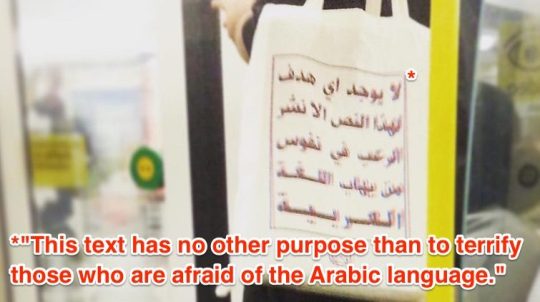
(I'm not saying the bag is harmful! The bag is brilliant! I mean the islamophobic attitude that prompts this fear.)
Think of the clowns on twitter who demanded that Ukrainians should adopt the Latin alphabet to 'distance from Russia' and 'show loyalty to the west' if they wanted support.
Now, in my personal experience, nothing deconstructs this effect faster than actually learning how these letters work. It just deconstructs so much of it because now it's no longer a wall of cryptic that is being vaguely associated with what little a person knows of a vague conglomerate of cultures, but it becomes a writing system. Just that. The kids learn how it works, how parts of it work. Recognising basic words or signs in a language - even if you just see a city-scape and recognise the signs for supermarket or taxi, it takes so much power away from any medium or framing that wants to scare you or present this as some foreign, exotic land that is completely different from your own. Instead, now the kid learns to see an every day scene of people living their lives - now, their eye is guided to the similarities, not the differences.
Even if you cannot read it fluently, recognising an 'a' or an 'l' - it turns a wall of foreign letters from an image into a text.
For example, seeing Korean letters and recognising elements of a character and knowing what sound it signifies or seeing Kanji and recognising radicals or parts of another Kanji that you might know - it completely changes the gaze you have on a foreign language, even if you don't speak it. So yeah, I generally think it's a good idea to show kids these mechanics and challenge their idea of (for many kids in the west) the universality of the Latin alphabet.
#and i also think it doesn't hurt their literacy in their own first language to practice this#for the record i don't think this will Press X To Abolish Racism of anything#i just think it would be helpful
54 notes
·
View notes
Text
A DISSERTATION ON ASTEROID CITY
Leaving a showing of Wes Anderson's latest film "Asteroid City" a few weeks ago, having pondered and puzzled over the anarchic, metatextual and science fiction vibes of the entire project, I was certain of one thing by the end.
I'm pretty sure that Wes Anderson is on the autism spectrum.
Like, there's really no other way to explain his quirky, offbeat, and matte painting filled style - the dude oozes hyperfixation and fascination with the strangest of details, and it's really proven by the way "Asteroid City" plays out.
Early on in the film, one of the three leads, junior astrologer and scientist Woodrow Steinbeck (played by Jake Ryan) is playing a name game of sorts with his fellow Junior Stargazer recipients, wherein one person mentions the name of a famous scientist or artist and the other person adds on to that, continuing in a Simon Says-like chain until it should, theoretically, be hard to follow.
After several names have been said and it's Woodrow's turn again, one of the other stargazers challenges him to name all of the people previously mentioned - in reverse order. He does it flawlessly. Since I know others on the spectrum that could do that with the entire alphabet at a young age, you can probably see where I'm getting at.
Later on in the film, following a military quarantine following the inexplicable arrival of an alien to the titular small town, we see the same stargazers - and what might they be doing now, you might ask? Continuing the same game with gleeful abandon and now throwing celebrities like Marilyn Monroe into the mix.
Of course, this isn't the only spectacularly bizarre detail that appears or re-appears throughout the course of the film. At three separate occasions, a slapstick worthy police chase and shootout involving no less than three vehicles passes through the main road of the town, with little acknowledgment from those who see it other than a shrug. It's not necessarily how the gag plays out in this case, though - rather, it's how it's set up and visually portrayed - almost with a sense of lucid unreality and focus on the particulars of what is happening. It's as if Anderson is relishing in the outright batshit insanity of it all - much like the entirety of the food critic hostage situation segment in The French Dispatch and the entirety of Fantastic Mr. Fox, two of his other works.
When you throw in various similarly odd running jokes involving a dancing roadrunner, someone burning their hand on a patterned griddle, a literal highway overpass to nowhere, real estate being sold from a vending machine, a Rod Serling style-guide who presents the play within a film setup in a loving tribute to the creation of such arts (and even intrudes on the "play's" narrative at one point by pure accidental happenstance), and nuclear bomb tests, it's easy to see why a case could be made for Wes' clear and uniquely neurodiverse position on the spectrum. Everything about "Asteroid City" might seem random at first glance, but there's a clear rhyme and reason to Wes Anderson's madness and how the entire narrative works and plays out.
Neurodivergent brains function in a state that is far from what might be considered societally normal or typical, tending to be drawn towards particular obsessive interests and playing with them in a style or voice that is uniquely their own. Over the course of a few decades, I have developed mine - with a love of films being among them. So, when I see a film like "Asteroid City" and admire its tonal consistency with such a wildly inconsistent set of characters and situations, having a clear love of well placed 50's and 60's musical needle drops and a song about the arrival of a benevolent alien told in an appropriately folksy style (Anderson even apologizes to the inspiration behind the song in the end credits for good comedic measure) in the same manner as my love of motorsports, Pixar films, and the scores of James Horner, I can only once again come to one conclusion.
I'm absolutely sure that Wes Anderson is on the autism spectrum.
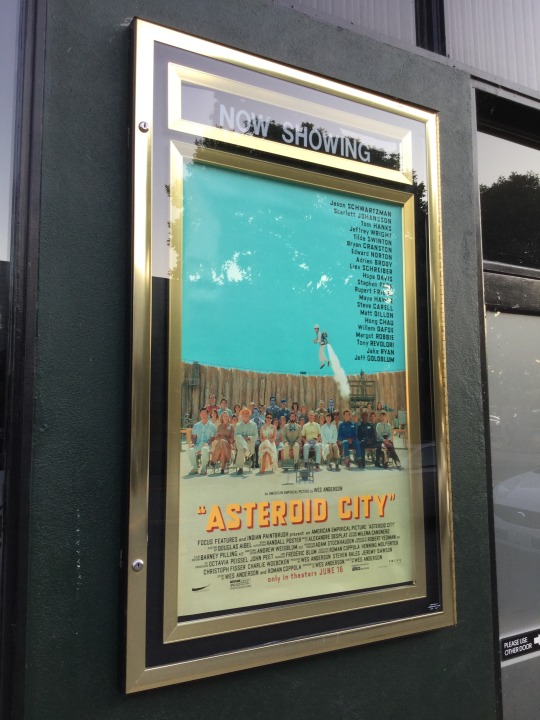
#wes anderson#asteroid city#Why does Augie burn his hand on the Quickie Griddle?#focus features#indian paintbrush#an american empirical picture
7 notes
·
View notes
Text
THE BEATLES - "NOW AND THEN"
youtube
The gang's all back together! And it feels so... uh, well...
[3.53]
Tara Hillegeist: As a way to squeeze blood and money from a legacy that doesn't need the teary-eyed hagiography half as much as it needs a rest, this is nothing short of ghoulish. As a chance for the surviving members of history's most-mythologized pop band to have one last chance to reckon with their memories of absent friends, and the sometimes-miraculous sometimes-acrimonious friendship that was responsible for a magical time in their lives not even death will see them outpace, however... would that we all could be so fondly remembered, despite giving it our worst. How do I score something at once this obscenely unnecessary and heart-wrenchingly earnest to two decimal places? Should I hope anyone is going to do the same, fifty years from now, for One Direction?
[5]
Taylor Alatorre: "The Last Beatles Song" carries about the same ring as "The McRib Farewell Tour," especially after McCartney's hasty clarification that the use of AI software for routine audio clean-up did not imply any procedurally generated singing. Still, I can't fault Peter Jackson for his basic recognition that, 54 years after "The End," Beatlemania has not yet bitten the dust. Given its origins, it was always going to be a challenge for "Now and Then" to avoid sounding like a song from nowhere, and it even takes a little while to avoid sounding like a tribute to Badfinger. But the decision to lean on the string section in the latter half, and the unabashed grandiosity of those sun-drenched vocal harmonies, help the song transcend its homework-like inception, turning its strange out-of-body nature into a selling point -- perhaps the selling point. Better to frankly acknowledge the role of earnest multigenerational fandom in the track's existence than to try and meticulously recreate the precise Revolver studio set-up.
[7]
Jacob Sujin Kuppermann: One of those songs that makes you want to quote Baudrillard and Adorno and Steyerl and meditate on the nature of aesthetic production under contemporary techno-capital. But frankly, I'm lazy and this song is a complete non-entity if you try and extricate it from the circumstances of its creation. Let me know when they find another lost demo and we get The_final_Beatles_song_[FINAL]_[REALLY FINAL].mp3
[4]
Edward Okulicz: Not much of a song, but has the benefit of quite a lovely, wistful arrangement. But that's it -- it's just not much of a song. I hope people aren't going to blame Giles Martin for it being rubbish the same way they blamed Jeff Lynne for "Free as a Bird" being terrible, because he's done a good job with not a lot of material to work with. I hope this makes the estates of John Lennon and George Harrison very happy.
[3]
David Moore: I know it's cringe to be so into the Beatles, to think about them all the time and know all their songs well enough that with some accuracy I'd be able to predict the next song in an alphabetical countdown, to read enormous biographies of them, to have strong opinions about the Glyn Johns mix of Let It Be. And I know this song is barely even a song -- that they scraped some fledgling John Lennon melody out of the bottom of a fish tank and let the wannabe Martin (the young one) and wannabe McCartney (the old one) and the one and only Ringo (immortal, eternal, peace and love) gussy it up with a half-convincing pile of pastiche instead of just letting the thing be (see what I did there; did I mention I have strong opinions about the Glyn Johns mix?). I know that there's something a little rank about it, like an air freshener in a morgue, even before Peter Jackson reminded everyone that his first film was called Bad Taste. And I know it doesn't speak very highly of me to admit that even given all that, and potentially worse things to boot, there's probably no way this could have gotten below a [5] from me no matter what final form it took. But it's the truth.
[6]
Joshua Minsoo Kim: This sad, misshapen ballad points to the Beatles' greatest fault: their lyrics could rarely keep apace with their musical curiosity. That's especially clear on the group's simpler, late-career songs, like this pathetic AI-assisted final single. Its aimless meandering finds an emotional core in the harmonized "you" that ends the first verse, but everything else fails to live up to that evocation, devolving into hackneyed sentiment. Released alongside "Love Me Do" to mark this as their final bow, "Now and Then" is a reminder that even when the Beatles started out, the simple lyrics held purpose: "Love Me Do" had relatively dry production compared to their contemporaries' work, and its raw sentiment was palpable, splitting the difference between schoolyard chant and workman-like charm. Comparatively, this track doesn't own up to its straight-ahead lyricism and uses a grandiose arrangement to convince you of its depth. Consider how Lennon admitted that "Something" was the best song on Abbey Road -- neither he nor McCartney could match the poetic grace that Harrison attained. We can now conclude that this was true until the very end.
[2]
Alfred Soto: George Harrison, as Jorge Luis Borges said about Oscar Wilde, was almost always right.
[3]
Aaron Bergstrom: I was in middle school in 1995 when The Beatles Anthology documentary premiered, and I hadn't planned on caring about it. I was an all-consuming sports nerd and music just wasn't something that registered with me. I knew the Beatles were a band. I probably could have given you "1960s" and "England," but that's about it. (Now, could I have recited the 1991 Minnesota Twins roster from memory? Absolutely.) Still, I lived in a small town before the internet and there wasn't much else going on. Anthology became the type of manufactured cultural event that I couldn't avoid. So while "Free As A Bird" wasn't the first Beatles song I ever heard, it was the first time I had the conscious thought, "Oh, so this is what the Beatles sound like." And... something happened. I can't really explain it. Like a fish discovering water, it suddenly clicked that the Beatles were everywhere. They were "I Want To Hold Your Hand" but they were also "Yellow Submarine" but they were also "Let It Be." I fell in love with the music, but it was more than that. I needed to understand why I loved it. It flipped a switch somewhere inside me that has stayed on ever since. I had to know everything. Who were they? Where did they come from? Why did they sound like this? Who else sounded like this? It's a straight line from that moment to me writing these words today. And I know most hardcore Beatles fans don't care for "Free As A Bird." Or "Real Love." I know that they're fake, and weird, and a cheap ploy to sell studio outtakes that otherwise weren't all that interesting, and I get it, but to me they'll always sound like the moment right before the world cracked open. I don't get to have that experience with "Now and Then." You only get to be a blank slate once. "Now and Then" is fine. It drags a bit. It's a rickety frame trying to support a lot of weight. It's even faker and weirder than the first two "new" Beatles songs. It probably didn't need to exist. Would it make my personal top hundred Beatles songs? I doubt it. But I'm glad it exists, if only on the off chance that it winds up as the bizarre first chapter in some other kid's origin story.
[6]
Katherine St Asaph: Pretty!
[6]
Nortey Dowuona: Shit is trash. Earth Wind Fire better.
[0]
Ian Mathers: If you ever doubt my commitment to TSJ, remember that I could have gotten through the rest of the year without ever hearing this song had it not appeared in the blurber. And I definitely wouldn't have seen its absolute godless abomination of a video. The song itself is mid, mostly just existentially inessential, but we need to take an absolutely harsh line against condoning shit like that video. To be very clear, I don't mean the technology itself, which I imagine could be used in all sorts of worthwhile creative and/or horrifying ways. I mean the specific cultural, aesthetic, emotional context of this video. I could be the world's biggest Beatles fan or hater (I'm neither!) and I would still feel the same way and give this the same mark.
[0]
Tim de Reuse: Given what the meaning of the term has warped into in the last year, the only reason to describe the use of source-separation methods as "Artificial Intelligence" to the general public is if you want people to think that a room full of sweaty engineers created a Lennon effigy out of linear algebra and poked it until it sang. The idea of finishing the work of somebody long-dead, making a collage of the debris that fell off of them when they were still breathing -- well, that's centuries old. Were they scared that the phrase "New Beatles Song" wouldn't cut it? Need to zhuzh it up a little? The idea that the Beatles, of all groups, would need a little sprinkle of our flaccid un-future to remain relevant is deeply funny to me -- doubly so, after noting how unremarkable the tune itself is, and how that pleasant unremarkability is exactly what people appear to be responding to. In the present moment we'd all kill for a pleasantly unremarkable week. Why on earth would you want to remind people that they're living in 2023?
[6]
Will Adams: "Hello, my name is Princess Jane. I would like to show you some tricks. I hope you enjoy it."
[0]
Michael Hong: Garbage in, garbage out.
[2]
Andrew Karpan: Among the great, indelible images of the early 21st century ought to be the sputtering, GIF-like loop of John Lennon joyfully playing with his tie, significance perhaps unknown until commissioned for use to illustrate a song he never knew he was writing and was only foggily aware of singing. Whether a revelation as advertised, or a creepy "echoey mausoleum" as warned is besides the point, since it isn't quite a song so much as a curious facsimile of one. Feels perverse to listen to it with anything besides curious awe.
[3]
Hannah Jocelyn: Damn "Now and Then," you've got the whole audiophile squad laughing. You have cutting edge AI technology, but not a dynamic EQ to take the resonances on John Lennon's voice? You have the last song from a legendary classic rock group, then seemingly slam an OTT instance on the mix bus to make it "modern?" The mastering engineer Miles Showell even said that he worked with the less limited mix, calling back to the last big audiophile controversy. And yet, Ringo's drums come in and I'm suddenly mini-Hannah, equally mesmerized by "Strawberry Fields Forever" and "Yellow Submarine" because I had no conception of 'good' and 'bad' yet. There IS a lot to love, if you're able to pick it out without turning on Dolby Atmos; Lennon's melody is unassumingly beautiful, and I even like Paul trying to be George with the slide guitar solo. The string arrangement is very Phil Spector-overworking-Let-It-Be, and Lennon would probably hate it, but I find it lovely. At any rate, it's better than "Postcards from Paradise."
[6]
Frank Falisi: Rough season to be a late-era McCartney truther. Why do you begin to think of your aesthetic project as dying in public? Politicians don't have the gumption to consider their mortality, so we're just left with the rot sloughing down the tubes of democracy, same as it ever was. What about pop stars? What about one of the pre-eminent experimental melodists in modern pop music? Living in the sundown shadow reach of every friend and lover and enemy, gone and departed before you. And to wake up, fingers cracked with England winter cold, capable of moving a bass string, just slower. To be on the worst end of the commodity inquest: they can keep bleeding your memory bank dry for dividends. A photo book, a lyric book, another lyric book, a legacy tour. Just one more memory in the bank. When does being garish back feel like all you can do? When does it not matter if you're composing out of love, if you're trying to write a new song, if you're trying to square your slowing mornings and long long nights -- every gesture gets legacy gnarl, an emotional formaldehyde that inverse's pop's gummy possibility. Lennon became a dorm-room poster ka-ching! before the dirt went cold. How else was it ever going to end? Why would an extractive system that can commodify even a novel melody, a heated-up lust change in how it treats its old stories? No Dylan Thomas rage, no Cohen hallelujah here, just the sneer of another old compatriot walking the long hallway blind to the end: "Because something is happening here but you don't know what it is, do you, Mr. Jones?"
[0]
Jonathan Bradley: A ghost of John Lennon summoned via digital séance, it hovers insubstantially in gloopy piano ectoplasm, bereft of melody, direction, purpose.
[3]
Brad Shoup: As a band that famously lived and created in the moment, the Beatles rarely had the sense of an ending. They were as fond of bits as statements, so they chased their two most renowned album closers with, respectively, pureed studio nonsense and a joke ditty about QEII. Though I'd take "Her Majesty" over "Get Back" any day, Let It Be (released after but mostly recorded before Abbey Road) became the final word on studio Beatles. The Anthology project offered a couple dreamy, slight psych-pop tunes that -- because they were based on compositions from a dead Beatle at his most placid -- couldn't be anything other than valedictory. In the years since we've had reductive Beatles and recombinant Beatles, and now, finally, maybe, retiring Beatles. "Now and Then" is as joyless as I've ever heard them. Not tired or dutiful, but lost: there's no trace of the bantering lads re-introduced in the Peter Jackson documentary. At their best, the Fabs felt like they were playing for each other as much as the world. Down two Beatles now, and again working off a John composition, they can only sound like they're playing to each other. The mix is as blue-gray as the cover art: little vocal homages to their past are buried in the churn. The string arrangement is ghastly. Paul's slide-guitar tribute to George -- in itself pretty funny, considering Paul's famous scene commandeering George's playing in the Let It Be film -- ends up in "Scar Tissue" territory. But even though I don't like this song, John's melody has stuck with me for a month now. By all accounts, it sounds like it's stuck with Paul (who knows from indelible melodies) for decades. There's something in its hesitancy, its uncertainty, in the way that it carries all this naked need to the door without knowing what's on the other side. My mom died -- suddenly, unexpectedly -- in January, so I've spent a lot of fucking time trying to get the sense of an ending. I've hung out with my father more this year than the last five put together, which means I've been talking about the Beatles more than usual. He doesn't care for "Now and Then": it's too sodden for him, too maudlin. I think he would feel that way regardless. But I understand Paul and Ringo's desire to summon their beloved John, to sing him back here and home again. And I understand why, when I play this, I mostly hear pain.
[5]
[Read, comment and vote on The Singles Jukebox ]
#the beatles#beatles#music#pop music#music writing#music reviews#the singles jukebox#music criticism#Youtube
4 notes
·
View notes
Text
Ok so ive made a list of things a wanna do with my gf and i Will show It to you guys
Going to the
the arcade
Making Heart shape pizza togheter
Lighting up a paper lanter togheter and making It fly
Playing Just dance togheter
Going only the two of us to a water park
Doing graffiti togheter
Laying down togheter in a massive flower field
Going to a Carnival and winking a plushie for her
Doing weird funny shit home alone
Get matching underwears
Going around with my shopping carta doting stupid shit
Exploring abbandoned places togheter
Dancing under the Rain
Going to see and art gallery
Preparing out confort food for eatchothers
Trying to do her makeup
Watching the Firework togheter
Playing the PlayStation eating Chips togheter
Taking pictures in a photo both togheter
Baking and decorationg a cake togheter
Collection cute flowers and leaves on a notebooks togheter
Going on a shopping spree togheter
Doing our nails togheter at the nail sailoon
Going to the cinema togheter
Make hot chai and going to relax on the sofà
Making a challenge togheter
Trying to win a plushie for her at the claw macchine
Going on a ferris wheel
Going to see a teather play
Have a romantic bubble bath togheter with candles
Building a lego set togheter
Going geocatching
Preparing a treasure Hunt for her
Playing chess in the park
Going togheter to paintball
Swimming pool date
Water gun fight
Building a there house togheter
Building a pillow Fort
Playing co-ops games togheter
Doing crochet togheter
Doing her hair
Playing d&d togheter
Going to look for Sea glass at the beach togheter
Going to gokart
Visit an art gallery togheter
Do an album and print all of our pictures in it
Do cute pictures togheter
Create particular dates with a special event
Create a relationship time capsule
The disposable camera photo challenge
Special intrest challenge
Start a collection togheter
Getting matching crocs
Collection cool shit we find on the ground Like crows
Get matching funky socks for eatchothers
Play on the swings togheter
Hooping on a random buss exploring the city
Reacreating scenes form out favourite cartoons
Do art and the ground with chalk
Silly string fight
Nerf gun war
Trying to talk One day in another language
Creating a story togheter
Make a PowerPoint presentation night
Get walkie talkie and talk to eatchothers
Chapstick challenge
Climbing trees togheter
Get aroun the Mall in One of those Kids Cars
Build myself and my gfa as legos and the build a lego house togheter
Making coffee for her
Making crown of flowers togheter
Get ourselfs maching kugurumi
Create out secret alphabet
Wrighting poeatry for eatch others
Going to the circus
Going togheter in a flower shop
Going togheter in a Mary go round
Sleeping togheter in a hamack
Go togheter in a hydromassage pool
Going to see a drag show togheter
Baking her a cake for her
Creating a fake city Just for fun togheter
Have a Nacho night while watching a film
Going to the Mall separetly and getting things for eatch others but with a theme
Making a guanti Sand Castle at the beach
Buying two PLUSHIES togheter and bringing them everywhere with us and making photos of them
12 notes
·
View notes
Text
Top 10 Films (plus a bunch of honorable mentions)
Much love and gratitude to @onigiri-dorkk for the tag! This was so much fun to do and (not going to lie) lightweight stressful 😅
So, real talk. One of the most challenging questions I get asked is What is your favorite movie?
Why? Because I freaking love movies. SO MUCH. I'm certain that there is some nostalgic piece to it: watching movies as a child was always a joyful activity, and — as my siblings and I grew up — family outings to the movie theatre were highlights of our summers.
(Now that I think about it, it probably has to do with the fact that my family came from limited means: spending time at the movies was a lower-cost option for us to escape reality, especially when we weren't able to go on vacations like my peers did. But I digress.)
Anyways, I LOVE MOVIES. As a visual medium, as a storytelling device. I will give almost any movie and any genre a chance (yes, even horror and extreme gore, although I have to really build myself up to get in the right mindset to watch it). I love learning about the filmmaking process, from the movie's technical aspects, to the nuances of its cinematography, to the director's and actors' psychological mindsets when approaching the film's creation. And nothing gives me more joy than being able to talk at length about movies I've watched with other people (watching and talking about movies together is probably my husband's and my shared love language, now that I think about it).
So, after spending a lot more anxious energy than I anticipated behind building this list, here are my top 10 films (plus a bunch of honorable mentions).
(Side note: I've listed them in alphabetical order because, while I've solidified that these are — indeed — my favorite 10 films ever, please do not ask me to stack rank them because it would be like asking me to pick my favorite child. I just love them all in their own ways, for very different reasons 😭)
—
Everything Everywhere All At Once (2022)

This film made me feel every emotion on the spectrum. I laughed. I cried. I clutched my chest in fear. I whooped. I was, ultimately, astounded at every minute. The mechanics of the multiverse are so unique, but — honestly — what I loved most was the fact that I actually felt seen, like my lived experience was depicted on-screen for one of the first times in over 30 years. I saw my parents in Waymond and Evelyn; I saw myself in Joy. And seeing my own emotional truths reflected back to me was enough to cement this as one of my favorite movies I've ever watched.
—
Get Out (2017)
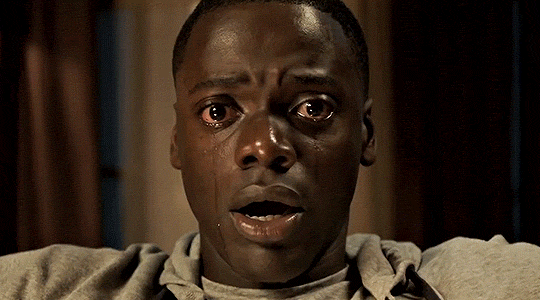
I am usually not one to sit through horror movies (while I will give everything a chance, it takes a bit more effort to convince me, especially if it has horror elements). But THIS ONE...! Disclaimer: I am a non-Black person of color. But growing up in the U.S., one becomes viscerally aware (or not, depending on your vantage point and privilege) of race and how it influences even the seemingly most innocuous interactions between racial groups. I loved how Peele was able to take everyday microaggressions and tease them out into true racialized horror — it's the one horror movie that I gladly return to!
—
Jurassic Park (1993)
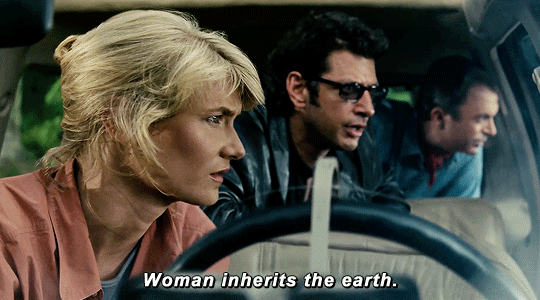
One of my comfort movies that really shouldn't be a comfort movie, lol. True, there are some plot holes. But I adore this film and its commentary on the rapid progression of technology, ethics in science, power, dominion, and the very real human folly of trying to control something that is beyond our understanding. Dr. Ellie Satler is the GOAT. And I still get chills when they first see the brachiosaurus with that John Williams score playing in the background.
—
Mad Max: Fury Road (2015)
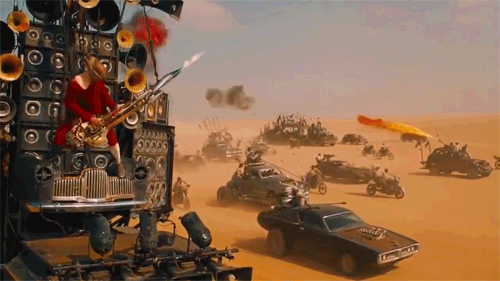
I remember that my husband wanted to watch this, and that I was a bit "meh" about it. And then, when we left the movie theatre, I was FLOORED by how much I enjoyed this...! In truth, I came in thinking that it was going to be a complete "sausage fest," but it completely subverted my expectations. It touches on a lot of themes that I gravitate toward in stories that I both consume and write: freedom, redemption, community, the fight against oppression. This entire movie was an adrenaline rush, and — once I saw that flame-throwing electric guitarist shredding across the barren desert — I knew that this world and its visuals would stick with me forever.
(side note: this is also why I'm unhealthily invested in @astyraea's warlord eremika AU, "i killed the sun for you." read it if you haven't yet!)
—
The Matrix (1999)

A freaking sci-fi cinematic classic! Yes, the visuals and special effects are groundbreaking. But what really sticks with me with this film (and why it's in my top 10) is the foundational exploration of reality and the tension between free will and predestination, between nature and nurture. Honestly, I do think that the messianic allegory gets a little unruly as the franchise progresses — but this first movie alone continues to shake me to my core.
—
Mean Girls (2004)
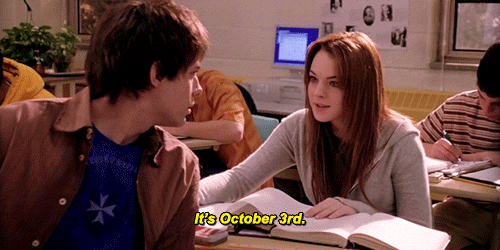
Would I even be a millennial if this movie wasn't on my list? Sure, there are jokes that are now problematic. But, in general, this movie is one of the most formative films of my peer group/my generation. It's our equivalent of "The Breakfast Club" or "Fast Times at Ridgemont High." I still quote it incessantly. I still always giggle when I wear pink on Wednesdays or when October 3rd comes along. But, most importantly, it just makes me laugh. And reminds me of simpler times in my life.
—
Moulin Rouge! (2001)
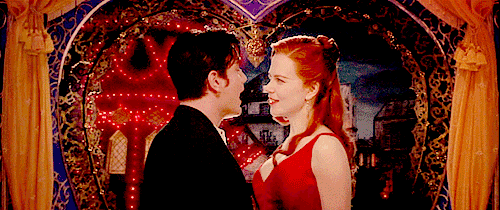
Seeing the majority of the movies on this list so far, you'd probably think that I'm an action and/or sci-fi movie junkie. Which, sure, I do love a great action flick. But, in my heart of hearts, I am a musical theatre kid, and the one movie musical that I adore wholeheartedly is
"Moulin Rouge!" The forbidden romance! The odes to creativity and poetry and love! The absurdly lavish sets and costumes! The Broadway-fied pop tunes!! Add on the tragic ending (spoiler, but c'mon - this movie is over two decades old), and it's the perfect mix of all my favorite outlandish tropes in one movie.
—
My Cousin Vinny (1992)
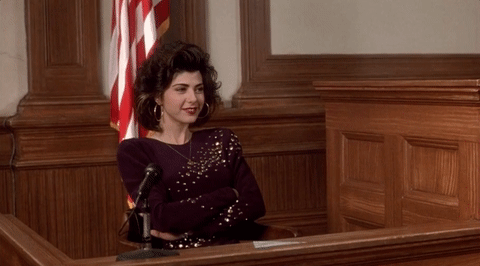
Okay, this one may seem out of left field, but this is truly a movie that I never get sick of. I remember that my dad put it on for my family one random evening when I was a teen, and it has stuck with me since. Not only is it hilarious (Joe Pesci's brazenness works seamlessly here), but it is also a surprisingly poignant exploration of how bias affects the U.S. justice system. ALSO, Marisa Tomei as Mona Lisa Vito is PERFECTION. Yes, her wardrobe is TO DIE FOR. But, more importantly, her climactic witness testimony as a "general automatic expert" is a beautiful middle finger to misogynistic assumptions everywhere.
—
Ratatouille (2007)

I love Disney, and I love Pixar. So the fact that this is the only Disney and/or Pixar movie in my top 10 is kinda mind-boggling. But "Ratatouille" is BY FAR my favorite Pixar film, to this day. I realize that I am very much drawn to the story of the underdog, seeing how they're able to accomplish their dreams when systemic realities prevent them from being able to do so. A rat as a chef?! The concept itself is so silly, yet so charming. And the fact that he overcomes the "villain" (the "evil" food critic) by cooking him something so heartwarming it reminds him of home?! Ugh, it warms my heart and my tummy rumble with hunger just thinking about it.
—
Spider-Man: Into the Spider-Verse (2018)

Okay, I know there are a lot of Marvel superhero movies out there, and I love them all in their own way. But none — NONE! — come close to the genius that is "Into the Spider-Verse." Technically speaking, the animation is BREATHTAKING, so seamlessly blending different styles as all the different universes converge. And the attention to detail just blows my mind! (One of my and my husband's favorite behind-the-scenes facts is that, until Miles fully embraces his powers, he's animated at a frame rate of 12fps, while the rest of the movie is animated at 24fps. This slight difference depicts him as slightly choppier, "less refined" than the rest of the universe, until he truly "becomes" Spider-Man — the scene in the above GIF is the first moment when Miles is also animated at 24fps.) Plus, while I love Peter Parker and the myriad of iterations that have come up over the past decades, it was really refreshing to see Miles Morales' story being told — and diverse representation is always a plus for me.
—
Runner-Ups for Top 10:
(I'm including these here because I literally kept going back and forth for maybe 30 minutes to figure out where they should sit in my top 10 😭)
10 Things I Hate About You (1999): the superior 90s teen movie and modern-day Shakespeare adaptation
Pride & Prejudice (2005): my ultimate comfort movie; this is what romance is
—
Honorable Mentions:
(These are other movies that came up as I was thinking through what films I love. I warned you at the beginning: this was a very difficult exercise for me to do lol, and I am just way too damn indecisive to fully commit haha.)
(500) Days of Summer (2009): amazing nonlinear storytelling and excellent subversion of the manic pixie dream girl trope
Atonement (2007): the tragic romance! that green dress! the library scene!!!
Bridesmaids (2011): raunchy comedies are my guiltiest pleasure, and I especially love them when the women are messy and problematic with minimal judgment
Clueless (1995): highly quotable, hilarious yet earnest; plus, young Paul Rudd as the goofy former stepbrother with whom she falls in love <3
The Dark Knight (2008): I love many, many, MANY superhero movies, but this will forever remain the blueprint for a top-tier, live-action superhero movie
The Devil Wears Prada (2006): a staple of the mid-2000s; the wardrobe STILL lives in my mind rent-free, and the Meryl Streep-Anne Hathaway-Emily Blunt trifecta is unmatched
The Little Mermaid (1989): while this may not be the most progressive movie, it is so magical — this was little Nina’s favorite (and Howard Ashman did that with the soundtrack)
Tangled (2010): a criminally underrated Disney Animation Studios movie, honestly; love this movie for many reasons, but ESPECIALLY the lantern scene and Mandy Moore as a Disney princess
When Harry Met Sally (1989): a rom-com classic and, truly, the ultimate template of friends to lovers and slow burn love
6 notes
·
View notes